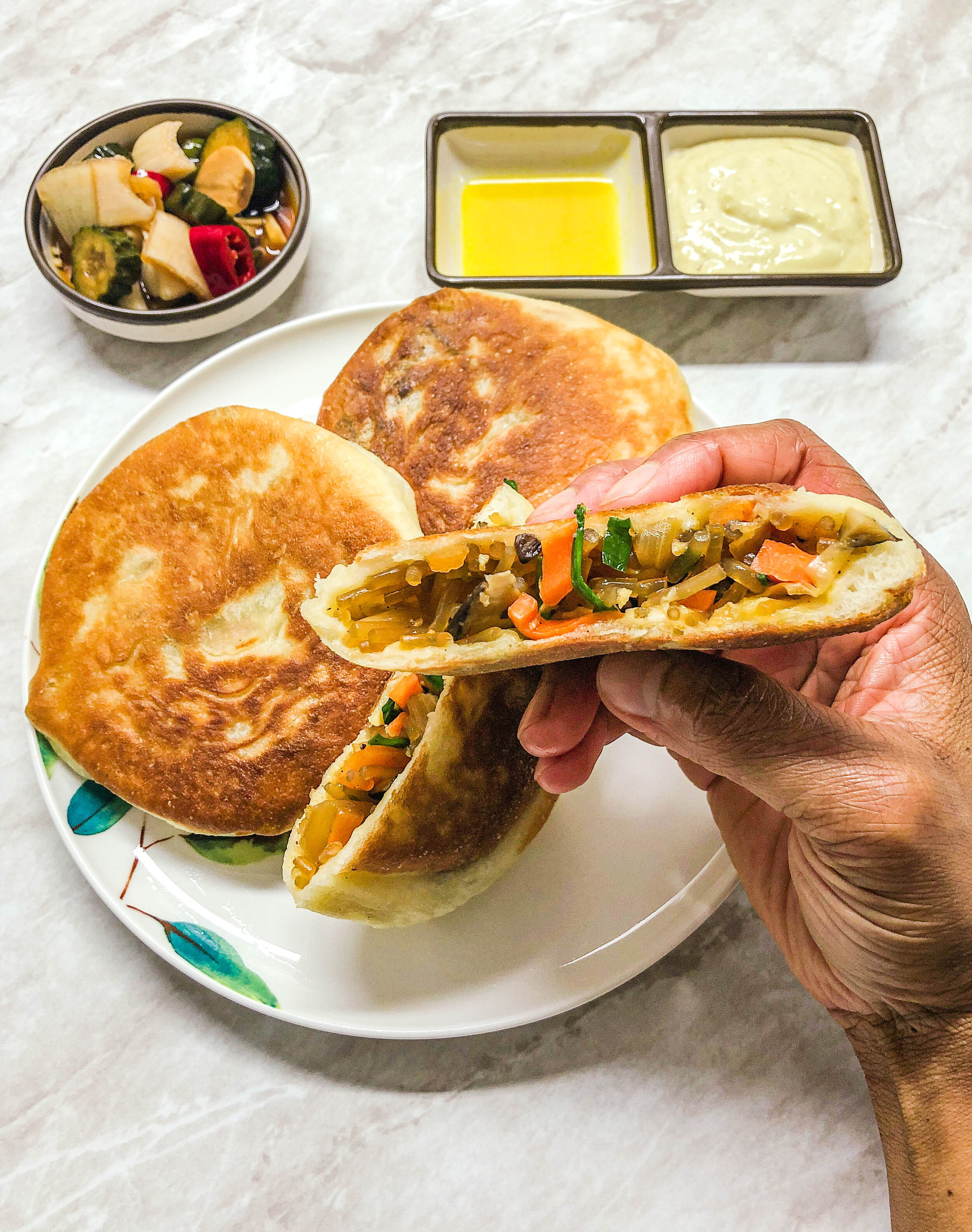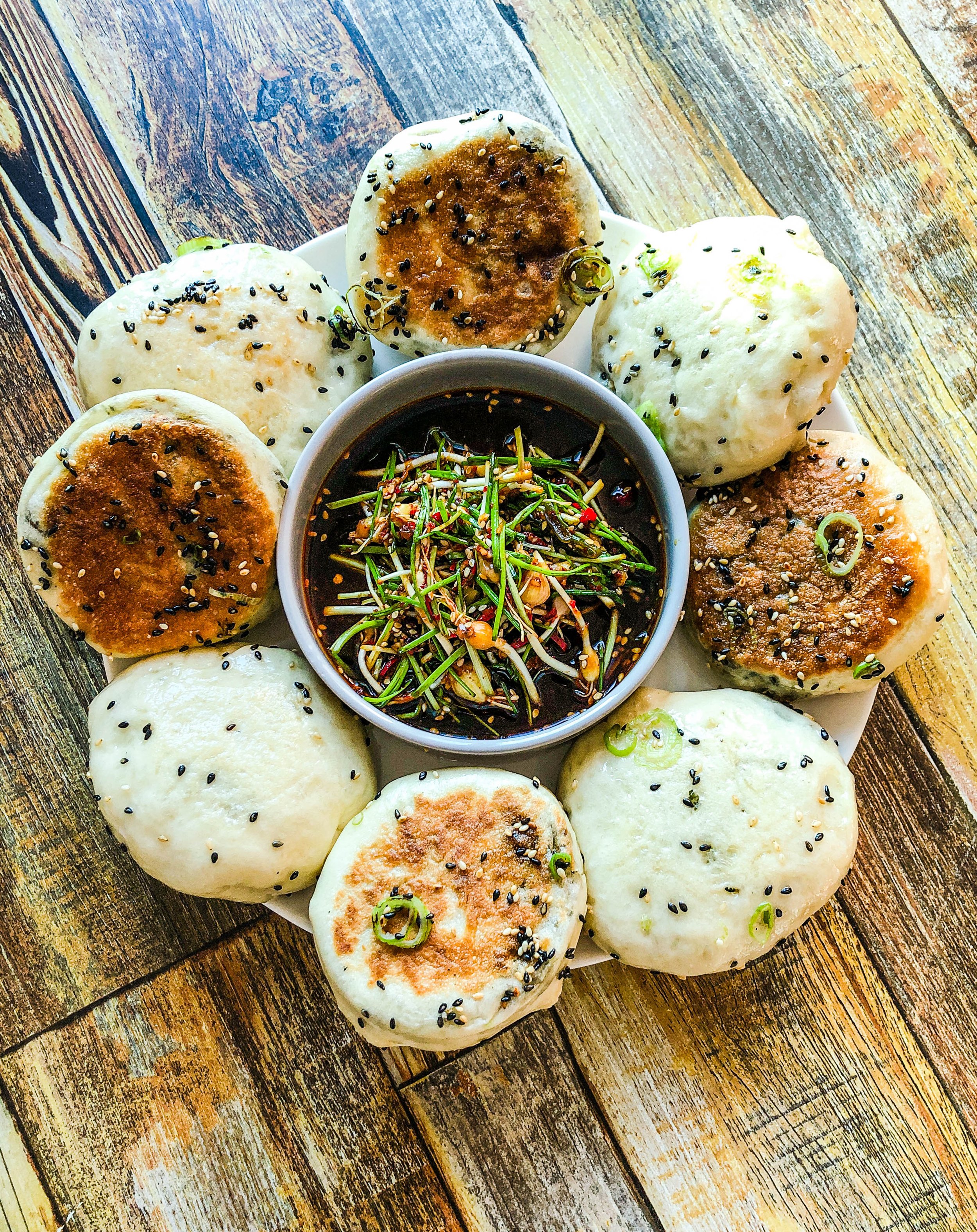Yachae Hotteok - Vegetable Filled Pancakes
Hearty vegetable filling wrapped in a crisp, chewy dough.
Yachae Hotteok - Vegetable Filled Pancakes
Makes 12 “meal-sized” hotteok
Hotteok are one of the top Korean street food snacks. They consist of a chewy dough typically wrapped around a sweet nutty filling, fried till golden and crisp and served folded in half in a paper cup. These vegetable hotteok are a fun twist on the classic. I’ve made them larger and filled them with a japchae-reminiscent filling. They are crispy outside, and full of flavorful chewy noodles with tender-crisp vegetables. I like to serve them with lots of things to dip into and crunchy pickles to add acidity and extra texture to each bite. These yachae hotteok are also, unexpectedly vegan.
“Recipe Tips:
1. Leftover hotteok can be stored in a plastic bag in the fridge for three days. Cold hotteok should be reheated in a toaster oven for 3 – 5 minutes or until heated through. Alternately, hotteok can be reheated in an oven at 200 C or 375 F directly on the oven rack for 5 – 10 minutes or until heated through.
2. 1 T of grated mozzarella cheese can also be added to the hotteok before closing.
3. 114g (0.25 lbs) seasoned, cooked and cooked ground meat added to the filling would also be quite tasty.”
Ingredients
Dough
300 - 375ml (1.50 – 1 2/3 c) water
6g (1 T) instant yeast
488g (3.75 c) AP flour
98g (0.75 c) glutinous rice flour
33g (0.25 c) whole wheat flour or AP flour
30g (2 T) sugar
9g (2.25 t) kosher salt
23g (1.5 T) vegetable oil
Filling
115g sweet potato starch noodles
227g (2 c) cabbage, julienne, cut into 1 in lengths
227g (2 c) carrots, julienne into 1 in lengths
180g (1 medium) onion, thinly sliced with the grain then cut in half
45g (0.50 c) buchu; garlic chives, cut into 1 in lengths – optional
167g (4 large) shiitake mushrooms, sliced
Sauce
7g (1.5 t) ginger, grated
6 garlic cloves, minced
6 T soy sauce
4 t sesame oil
4 t mirin
4 t sugar
1 t black pepper
0.75 t kosher salt
0.75 t ground coriander
0.25 t ground turmeric
Recipe Know-how
Dough
1. Dissolve the yeast in 150ml (0.75 c) of the water. Allow to stand 5 - 10 minutes or until bubbly.
While yeast is standing, continue on with next step.
If the yeast does not begin to bubble after 10 minutes, throw the yeast away and begin again.
2. In a large mixing bowl combine the dry ingredients.
Add the yeast mixture and oil, mixing to begin forming dough.
Add remaining water a little at a time until a medium soft, slightly sticky dough forms.
Place dough on an unfloored surface, use the slap and fold method for 1 – 2 minutes to begin forming gluten and lessen some of the doughs’ stickiness.
Continue to knead dough normally for 2 – 3 minutes longer or until smooth. Form into a ball.
Place the dough ball into a lightly oiled bowl. Cover.
Bulk ferment 1 – 2 hours or until doubled in bulk.
Make the filling while the dough ferments.
Filling
3. Bring a pot of water to a boil.
Add the noodles. Cook 1 minute less than package directions.
Drain and run under cold water until cool.
Use a fine strainer as the noodles may slip through a larger holed strainer.
Using a pair of kitchen scissors, cut the noodles into 3 – 4cm (1 – 1.5 in) pieces.
Allow to sit in strainer to continue draining until needed.
4. In a medium bowl add the carrots and sprinkle with 0.50 t kosher salt, toss well to coat. In a separate medium bowl add the cabbage and sprinkle with 0.50 t kosher salt, tossing well to coat.
Allow vegetables to sit for 10 – 15 minutes tossing once or twice or until liquid has begun to escape.
Continue on to Step 5 while the vegetables salt.
Squeeze any remaining liquid from the carrots and cabbage.
Set aside and discard the liquid.
5. In a small bowl, combine the sauce ingredients stirring until the sugar dissolves. Set aside.
Return to the vegetables in Step 4.
6. In a large saute pan. Heat 1 t vegetable oil over medium high heat.
Add the mushrooms and cook 3 – 5 minutes or until wilted and lightly browned.
Remove to a large bowl.
Add the carrots and cook 1 minute. Remove to the large bowl.
Add the onions and cook 90 seconds, adding an additional .5 t oil if needed. Remove to the bowl.
Add the cabbage and cook 1 minute longer. Remove to the bowl.
Add the noodles and half of the sauce to the pan, cook 90 seconds. Remove to the bowl with the vegetables.
Cool 2 – 3 minutes.
Add the buchu and remaining sauce to the bowl and mix well.
Cool completely.
Stuffing and Cooking
7. Lightly oil the entire work surface and hands with vegetable oil.
8. Divide the dough into 12 equal portions. Set to one side covered.
Working one ball at a time, roll into a 12 cm (4.75 in) circle that is slightly thicker in the center and thinner on the edges.
Fill a 1/3 measuring cup with the filling. Ensure there is no filling hanging out of cup.
Place the filling into the center of the flattened dough, leaving the measuring cup on top of the filling. Loosen all sides of dough.
Remove the measuring cup.
Pull the sides of the dough into the center over the filling, pinching tightly to form a seal.
Be careful to not let any of the filling touch the edges.
You will have to push the edges together well to ensure the filling is well sealed inside.
Seam side down, gently rotate and cup filled ball reinforcing the seal. Set back in its place. Cover.
Repeat until all dough has been filled.
9. Heat 50ml (0.25 c) vegetable oil in a large saute pan on medium heat for 3 – 4 minutes.
Cover a rimmed baking sheet with paper towel. Set aside.
Preheat oven to 120 C / 250 F.
Place 3 hotteok in the pan. Reduce heat to low.
The oil should sizzle gently.
Cook 1.5 minutes.
Flip. After 10 seconds, gently press down on hotteok until they reach approximately 10 cm (4 in) in diameter. Cook 1.5 minutes.
Flip again cooking 1.5 minutes longer on each side.
There should be a gentle sizzle while cooking, however, nearing the end of the second 1.5 minutes, it may seem like nothing is happening. This is normal and the heat should not be increased.
You will know that proper heat has been maintained throughout cooking if, there is not much oil absorbed.
Remove cooked hotteok to paper towel lined pan and place in the oven to keep warm.
Increase heat to medium again to reheat pan for 1.5 minutes before cooking the next batch.
Be sure to reduce the heat to low again once the hotteok have been added.
Repeat with the remaining dough until all has been cooked.
If necessary, after cooking 2 – 3 batches, you may need to add 1 T more oil.
10. Serve with wasabi mayo, Asian hot mustard thinned with rice vinegar, jangajji and vegetable side dishes.
Be sure to serve some of the jangajji brine with the hotteok as the brine drizzled int io the hotteok is delicious.







